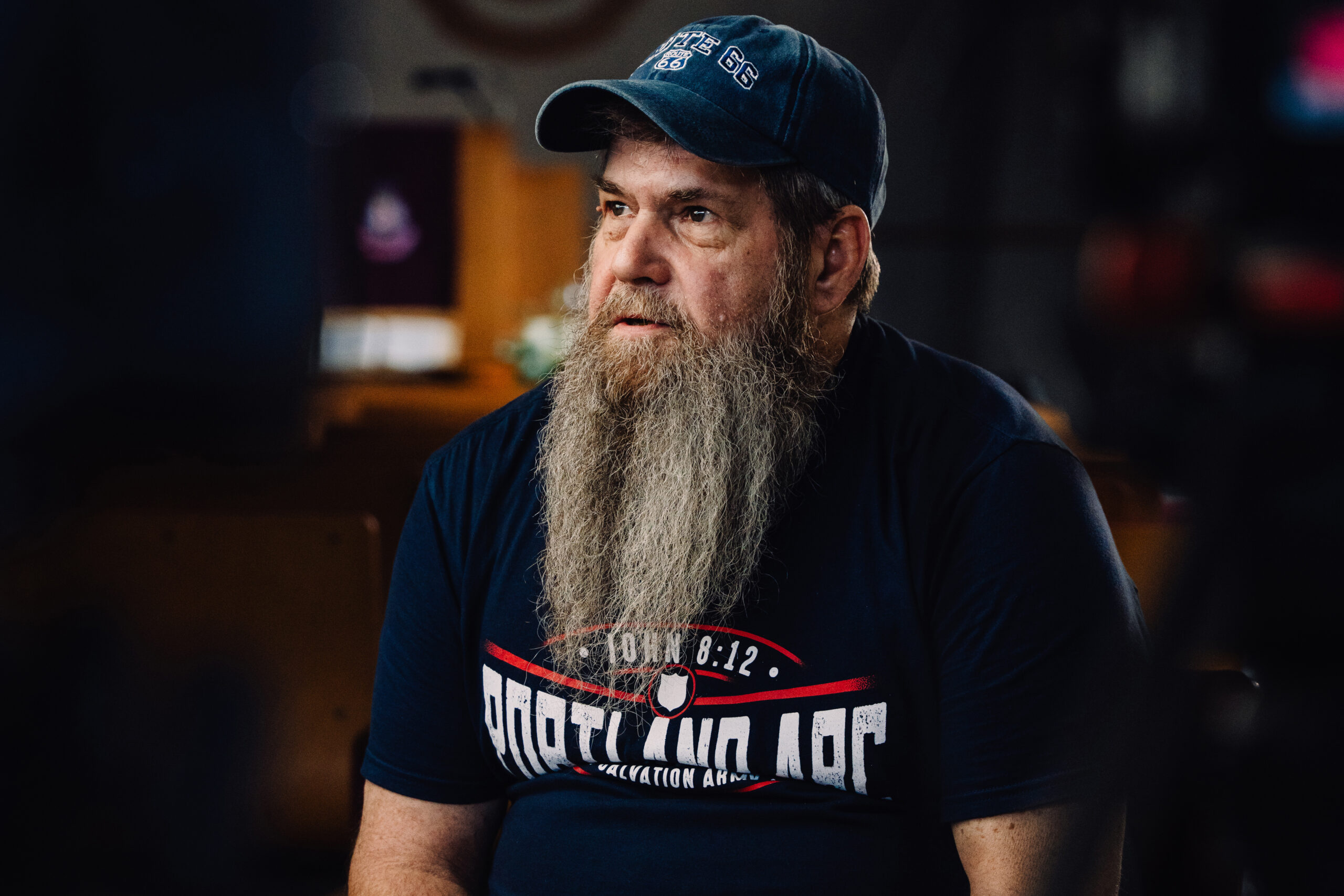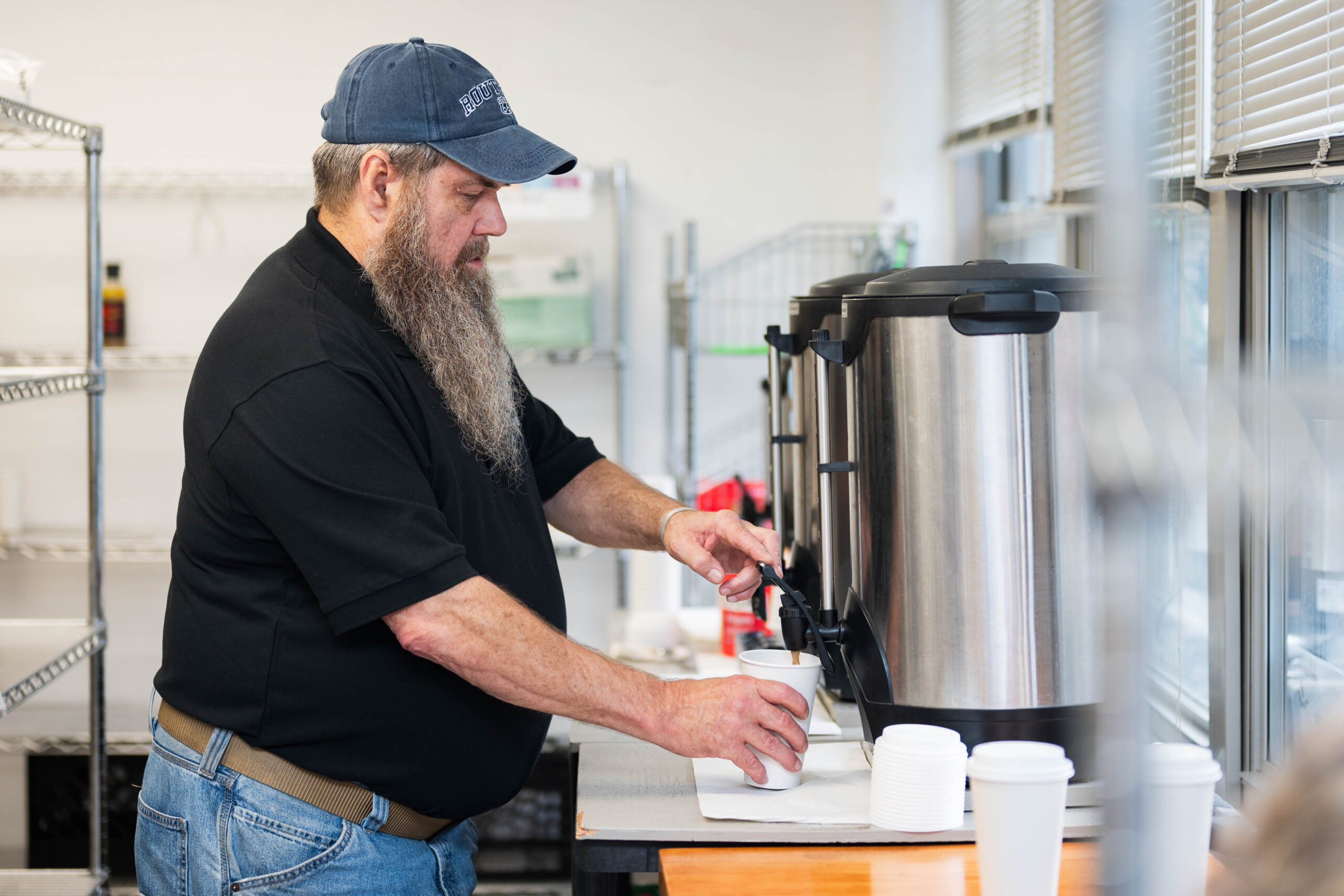Sobriety Through Service
by Robert Mitchell

Walt Kehoe once struggled with drugs and alcohol, but now he keeps himself so busy serving, he doesn’t think about his past.
If it’s happening at The Salvation Army in Portland, Maine, chances are maintenance man Walter “Walt” Kehoe is right in the thick of things.
This church in the heart of downtown Portland is busily committed to The Salvation Army’s mission. In the mornings, Walt and other volunteers serve steaming cups of coffee to the city’s hurting and homeless. When large numbers of asylum seekers arrived in the city last year and the church’s gym floor served as a nightly sanctuary and a place for weary bodies to sleep, Walt was there behind the scenes, helping make it all happen.
Walt is not specifically trained in maintenance but says, “I just know a little bit about a lot of things.” He spent most of his life as an equipment operator before coming to The Salvation Army after graduating from the organization’s Adult Rehabilitation Center (ARC) program.
“I’m a jack-of-all-trades type person for the property,” Walt says.
“Therefore, my dear brothers and sisters, stand firm. Let nothing move you. Always give yourselves fully to the work of the Lord, because you know that your labor in the Lord is not in vain.”
—1 CORINTHIANS 15:58
One of the signature ministries at the Portland Corps is Holy Grounds, the morning coffee outreach to homeless people, shelter residents, and migrants. It’s not uncommon to see a line form outside the coffee window even before it opens at 7:30, but Walt usually arrives around 5 or 5:30 a.m. to start the brew and get everything ready.
Captain Michael Harper, who is the former corps officer in Portland, and Walt used to hit the streets once a week in the church’s canteen serving coffee before starting Holy Grounds. Two years ago, Harper bought a fast food–style window and asked Walt to install it facing the busy street outside the church.
“I put that window in, and we were off to the races,” Walt recalls.
Ministry of presence
Holy Grounds at one point was giving out 400 cups of coffee every morning, but that has slowed down some with the closing of a nearby homeless shelter. Walt and Harper often engage the recipients and pass out Bibles and tracts. Sometimes they just sit and listen and let those struggling with life share their stories.
“We just go out there and converse and be an example for the people,” Walt says. “I see the struggle. In kind of a weird way, their struggle helps me stay sober. I remember where I came from.”
Walt helps them celebrate their personal victories, such as finding a job, a place to live, or even getting into the ARC with a chance to turn their lives around with Christ’s help.
“Not everybody will listen to these people,” Walt says. “Then you try to give them advice. I give them a hand up, not a handout. A lot of people are stuck, and they can’t find a way out. I’m always recommending the ARC as a better way of life.”
The church also offers English as a second language (ESL) and computer classes to help migrants adjust to life in the United States. Walt, as the maintenance man, led the effort to renovate the space that serves as the classroom.
“I organize things so they can do their classes,” he says. “It’s very rewarding. I don’t have time to think about drinking and other things anymore. They can rely on me, and they know that.”
Last year, Walt was busy making sure the church was ready for migrant families to come each evening for dinner and to sleep on the floor of the church’s gymnasium. The migrants now sleep elsewhere.
“There were almost 80 migrants down there on mats every night,” he said. “They came from several different countries to get here. They were grateful because they weren’t being shot at. Now, they mostly come for ESL and computer classes.”

Every day, Walt Kehoe prepares coffee for the corps’ morning ministry of hot cups and sympathetic ears.
The go-to guy
The church also depends on Walt for more routine tasks, such as snow removal. He helps transport Christmas gifts during the holiday season and delivered meals after the mass shooting last year in nearby Lewiston, Maine. He also helps with Christmas kettles, an emergency clothing closet, and anything else that needs to get done.
Walt has overseen several upgrades around the church, including a kitchen renovation, the construction of a fence around the property, a new sound booth in the sanctuary, new railings, and upgraded lighting. The building also houses The Salvation Army’s divisional headquarters.
“Walt has become an indispensable member of our team,” Harper says. “His previous work experience and broad knowledge of service and repair makes him extremely valuable to our facility.”
Walt also attends church at the Portland Corps, which until recently was led by Harper and his wife, Major Armida Harper. It’s a far cry from Walt’s days growing up as a Roman Catholic in Sherburne, N.Y.
“I was just going through the motions back in the day,” Walt says. “I had to go to church because that’s what we did, but I did it just to go. Now I go to learn, and I really believe in God and live that way.”
Harper says he often finds Walt beginning his day reading from a Max Lucado devotional or from scripture. Walt, who considers Harper “my spiritual role model,” also reads a book of meditations at night and prays during the day.
“Walt has told me several times that his recovery is his new full-time job,” Harper says.
Hitting rock bottom
Now 63, Walt was an altar boy growing up as the son of an undertaker in economically depressed upstate New York. He fell in with the wrong crowd.
“It was peer pressure,” he says. “We didn’t have a lot to do in a small community. We ended up drinking and smoking pot. It escalated. It’s been a problem my whole life.”
He joined the Navy and later returned to Sherburne, where his drinking continued. A series of rehabs and relapses followed as he bounced back and forth between his hometown and Maine, where he had family.
“The Salvation Army has saved my life, there’s no question about it. It got me thinking right. Now I’m working at the church, and we’re about helping people every day. Giving back is keeping me sober.”
For one nine-week stretch, Walt was homeless on the streets of Old Orchard Beach, Maine, where The Salvation Army holds its annual camp meetings. He made it through because it was summer—not Maine’s brutally cold wintertime.
“You see a lot of people overdosing, and the temptations are all around you,” Walt says of being homeless. “It’s kind of scary. I got through it. I never gave up on myself. I always had hope. I had faith in God—I just wasn’t 100% plugged in all the time.”
Eventually Walt got a job and an apartment in Old Orchard Beach. “But all my downtime was drinking. Then I started doing pills and cocaine. I quit my job so I would run out of money to force myself to get help” and get sober.
“I didn’t know where I was going, I just knew I needed help,” Walt says. “My faith in God and everything else was gone. I was in a spot where it’s very difficult to see yourself stop drinking. It gives you a panic and an uneasy feeling.”
After another failed rehab stint, he walked through the doors of the Portland ARC on Friday, Aug. 13, 2021. This Friday the 13th was not unlucky. It turned out to be the most blessed day of Walt’s life.
“I’ve been sober ever since,” he says.
Power of prayer
Walt said he found his “spiritual side” at the ARC, along with structure and a regular schedule. In the past, all his prayers had been of the desperate, foxhole variety, but that all changed with the spiritual disciplines he learned. His prayer life thrived like never before.
“I was praying to God before, but I wasn’t really living it or believing it and it didn’t change my life,” Walt remembers. “The ARC got me to live in the present day. When I was using alcohol or drugs, I was either in the future or in the past. I wasn’t in the moment. I wasn’t doing anything to help anybody else or myself. So, the ARC changed my thinking and my spiritual side. It got me believing in God and Jesus as my Lord and Savior.
“The Salvation Army has saved my life, there’s no question about it. It got me thinking right. Now I’m working at the church, and we’re about helping people every day. Giving back is keeping me sober.”
Envoy Stephen Taylor, the former administrator of the Portland ARC, vividly remembers Walt’s resolve.
“When Walt came in the program, he was determined to get his life back,” Taylor says. “He worked hard at the program. He was like a sponge and wanted to absorb everything he could. Here we are two-plus years later and he is still going strong. His relationship with the Lord has evolved and he knows with God at the center of his life, he can’t go wrong.”
Soon after Walt completed the ARC program, a maintenance job opened at the Portland Corps. The timing couldn’t have been more perfect. Reflecting on his long journey, Walt believes God had a plan for his life, and he is now living that out thanks to The Salvation Army’s showing him a relationship with Christ and a better way to live.
“I don’t know what I envisioned, but I knew I wanted to stay around The Salvation Army because they had something going on that I wanted,” he says. “Through the grace of God, I got my wish. All of a sudden, a maintenance job opened up and I was hired. I mean, that’s God’s work right there.”
Salvation Army ARCs are nonclinical facilities that serve individuals with a variety of problems, including those who have had challenges with alcohol and drugs.
photos by Kevin Diaz (top) and Leah Carter (center)

